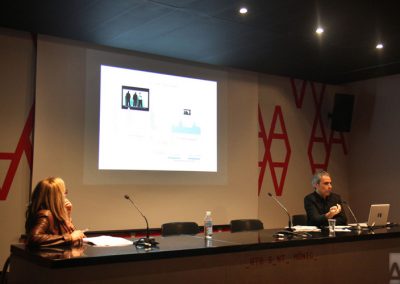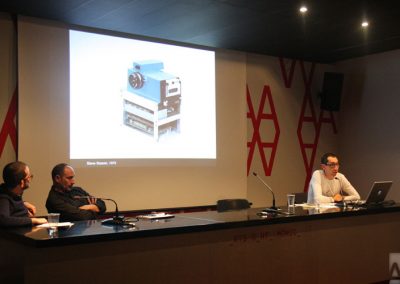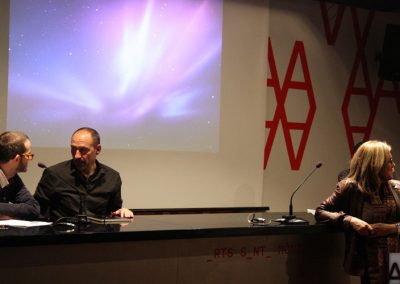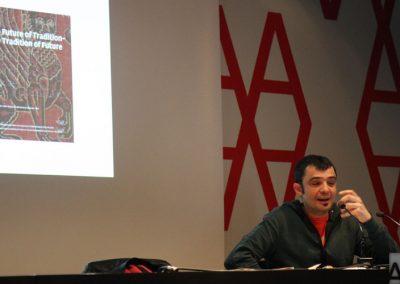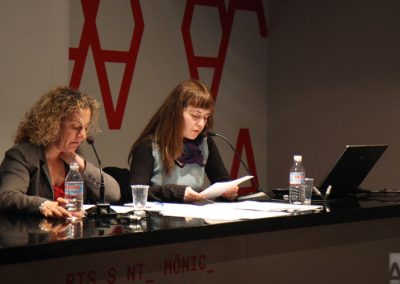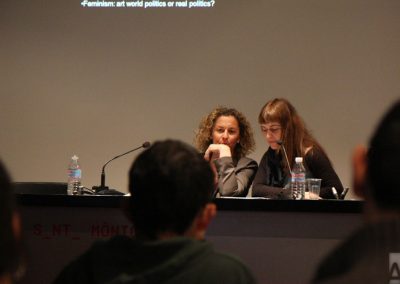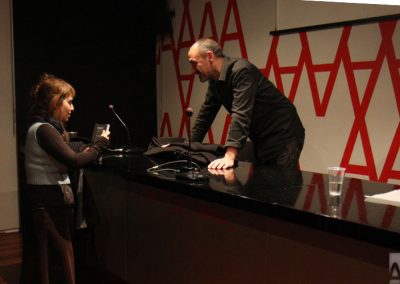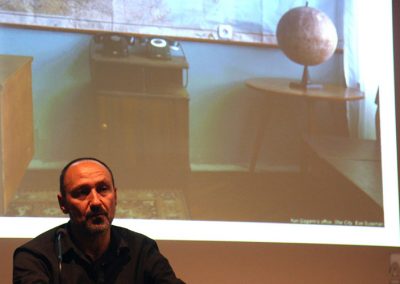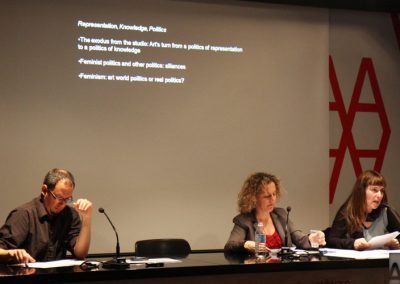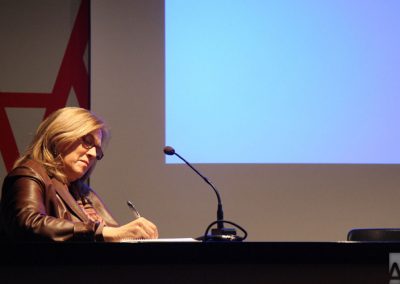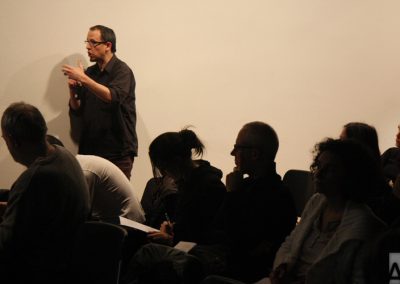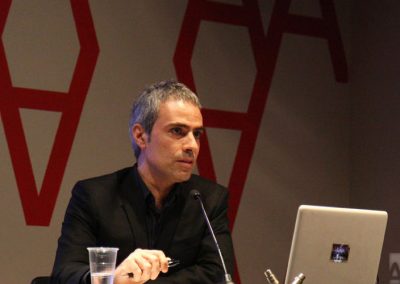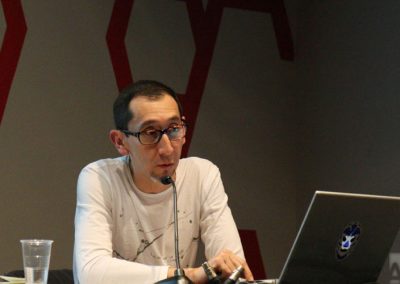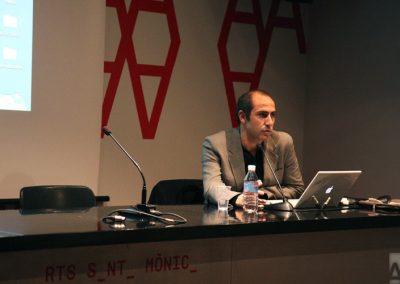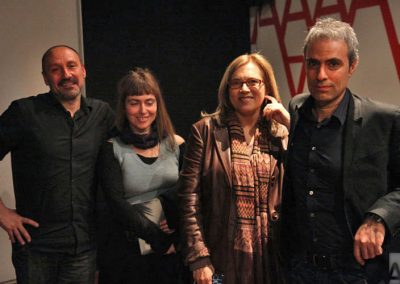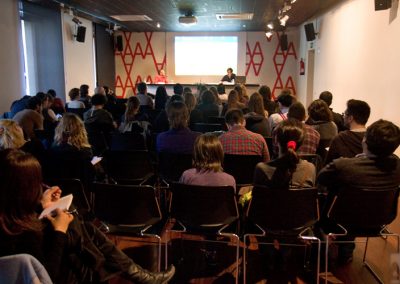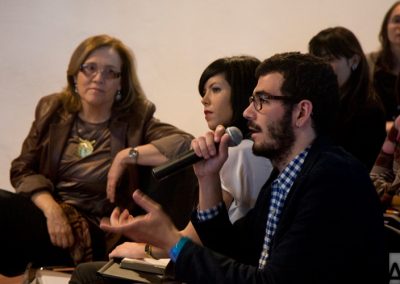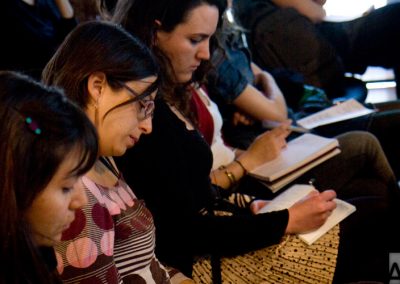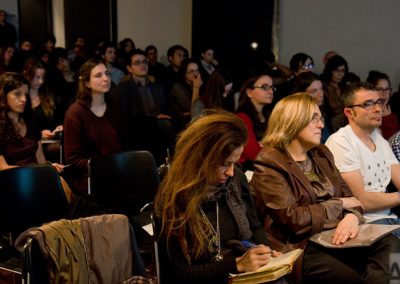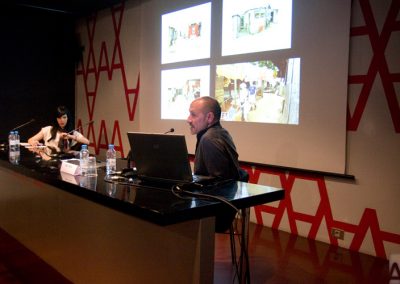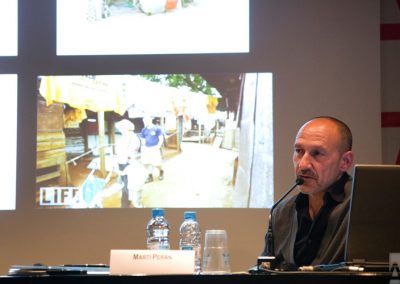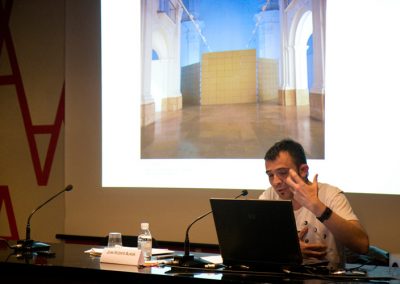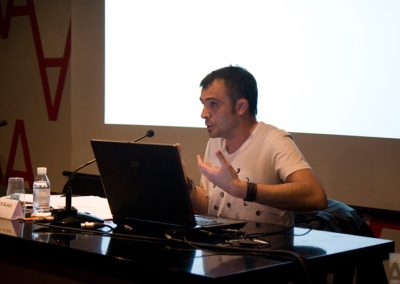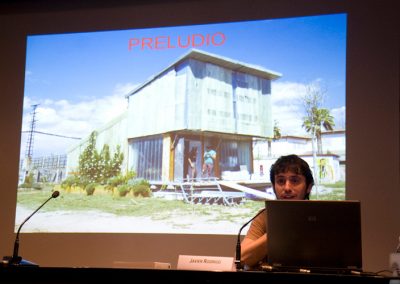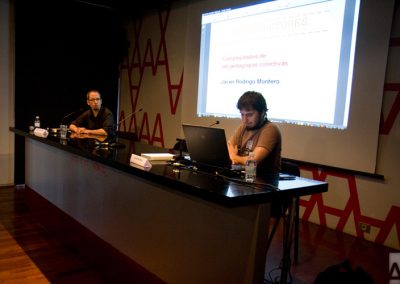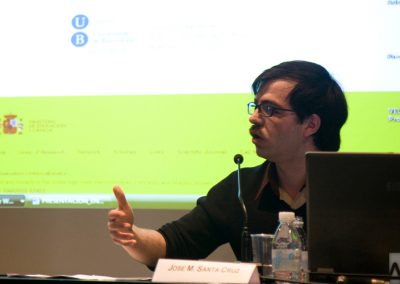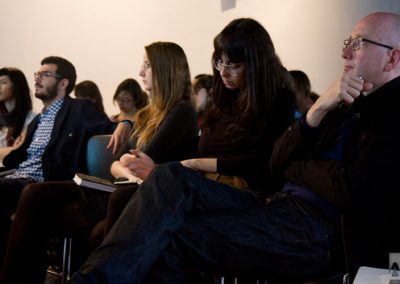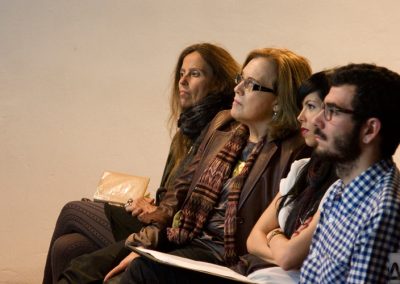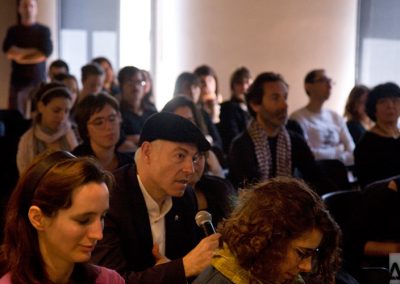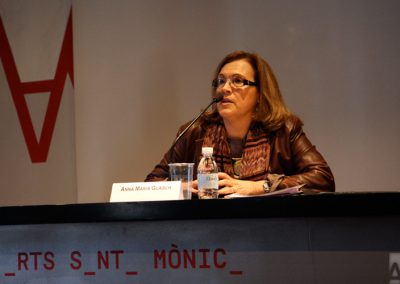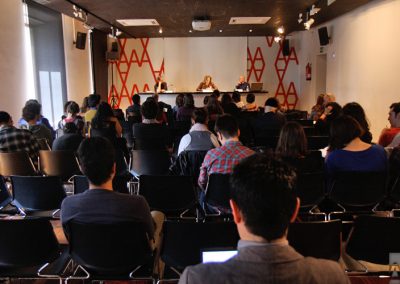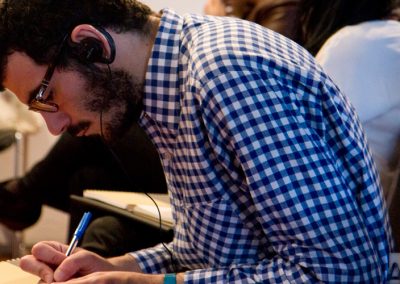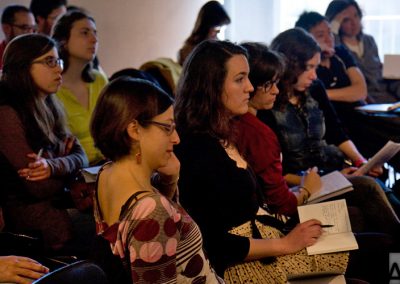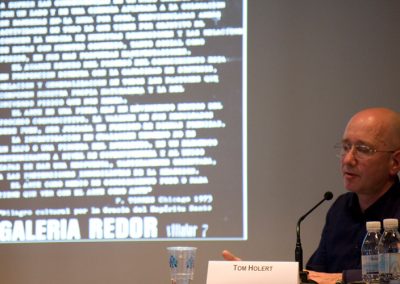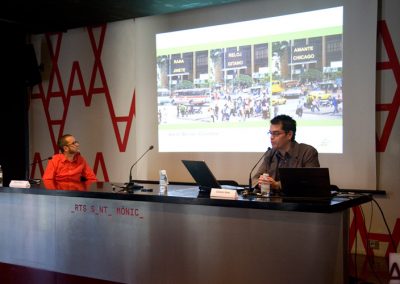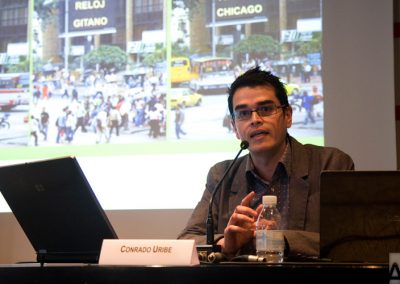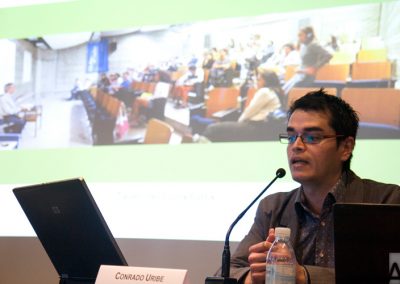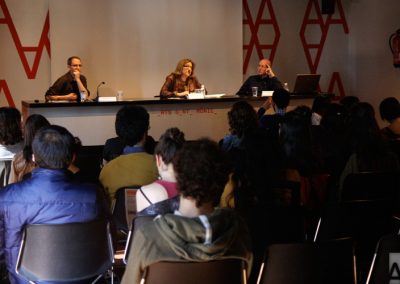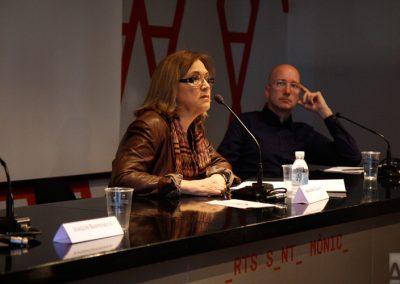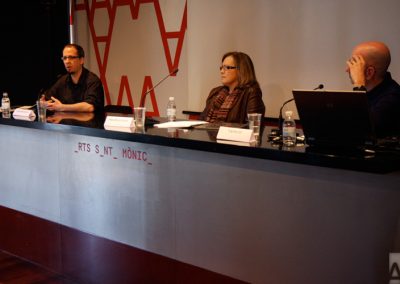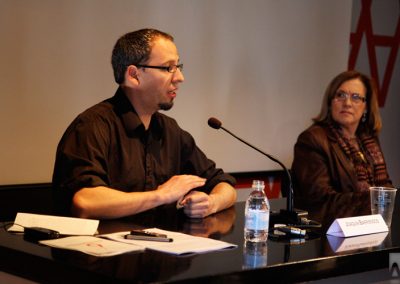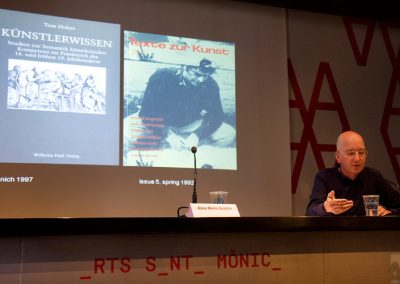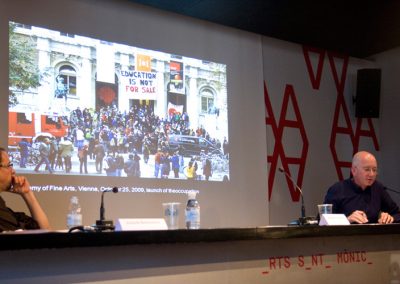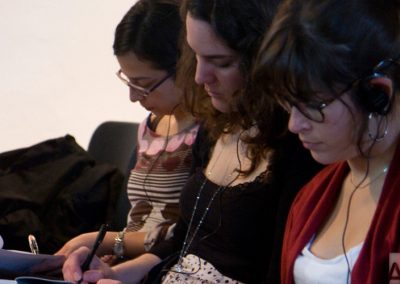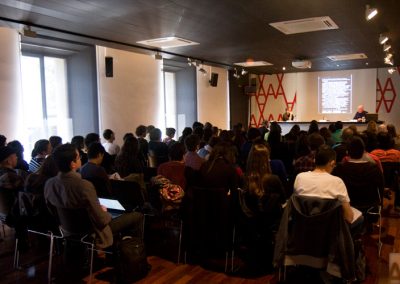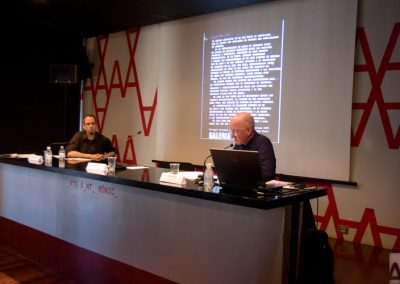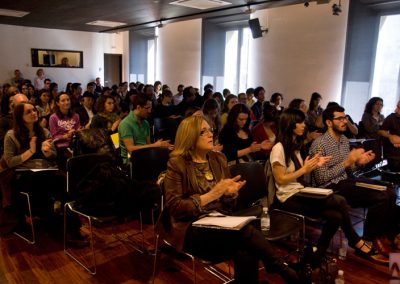¿Reescribiendo la Historia del Arte? Diferencia, Globalización y Producción de Conocimiento
5to Simposio Anual
Marzo 5, 2011, Barcelona, Catalunya
Equipo Organizador
Oradores Principales
Juan Vicente Aliaga, Universitat Politècnica de València
José Luis Bravo, Universitat de Barcelona
Angela Dimitrakaki, The University of Edimburgh
Carles Guerra, Pompeu Fabra University
Francesco Jodice, Artist-Milab
Martí Peran, Universitat de Barcelona
Moderadores
Joaquin Barriendos, Columbia University, Nueva York
Anna Maria Guasch, Universitat de Barcelona
Rafael Pinilla, Universitat de Barcelona
Arola Valls, Universitat de Barcelona
Convocantes
Joaquin Barriendos, Columbia University, Nueva York
Anna Maria Guasch, Universitat de Barcelona
Con el apoyo de
Arts Santa Mònica
Ministerio de Ciencia y Educación / HAR2010-17403 / 2011-2013
University of Barcelona, Departament de Historia de l’Art
Programa
INTRODUCCIÓN
10:00 / Presentación
Anna Maria Guasch, Joaquín Barriendos
DISCURSO DE APERTURA
10:30 / Angela Dimitrakaki
Gender, Art and Capital: Feminist Politics in the Age of Multitudes
Moderador: Joaquín Barriendos
PANEL 1
12:30 / Juan Vicente Aliaga
Beyond the halal/haram binomial: Gender, Sexuality, and Politics in Some Current
Artistic Practices in the Arabic World
Moderador: Joaquín Barriendos
PANEL 2
17:00 / Jose Luis Bravo
Expanded Photography: Have Contemporary Artistic Practices dissolved the Photographic Ghetto?
Moderador: Rafael Pinilla
PANEL 3
17:30 / Francesco Jodice
City-Tellers: DUBAI
Moderadora: Anna Maria Guasch
PANEL 4
19:00 / Carles Guerra
1979: A monument for radical instants
19:45 / Martí Peran
Indirect Style: Stories of Impatience
Moderador: Arola Valls
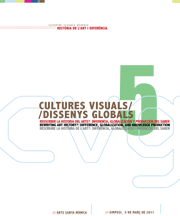 The debate proposed for the fifth edition of VC/GD focuses on the way in which current globalization has questioned, reinvented or disrupted the discourse of cultural difference. Thus, the ambiguities and false universalism of so-called ‘feminisms’ and ‘post-feminism’ will be the starting point of this symposium. As we will try to bring over the table, the South-South dialogue and the diversification of traditional forms of knowledge production have produced a radical epistemic turn. Diverse disciplines (including geography, anthropology, sociology, art history, among others) and certain fields of study (such as visual, identity, production/reproduction of culture) have been drastically questioned by this epistemic shift. How does feminist art history deals with intersectionality? How can we articulate at a global scale claims made by divergent movements such as chicano feminism, ‘black feminism’, Caribbean feminism, feminism of the multitudes, etcetera, without appealing for universality nor perpetuating the Eurocentric liberal feminism? Finally, as Angela Dimitrakaki has pointed out, Is it possible to reactivate the project of a feminist and materialist method addressed to the art world in particular and to the global production of knowledge in general?
The debate proposed for the fifth edition of VC/GD focuses on the way in which current globalization has questioned, reinvented or disrupted the discourse of cultural difference. Thus, the ambiguities and false universalism of so-called ‘feminisms’ and ‘post-feminism’ will be the starting point of this symposium. As we will try to bring over the table, the South-South dialogue and the diversification of traditional forms of knowledge production have produced a radical epistemic turn. Diverse disciplines (including geography, anthropology, sociology, art history, among others) and certain fields of study (such as visual, identity, production/reproduction of culture) have been drastically questioned by this epistemic shift. How does feminist art history deals with intersectionality? How can we articulate at a global scale claims made by divergent movements such as chicano feminism, ‘black feminism’, Caribbean feminism, feminism of the multitudes, etcetera, without appealing for universality nor perpetuating the Eurocentric liberal feminism? Finally, as Angela Dimitrakaki has pointed out, Is it possible to reactivate the project of a feminist and materialist method addressed to the art world in particular and to the global production of knowledge in general?
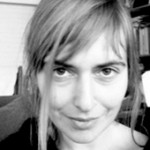
Discurso de Apertura:
Angela Dimitrakaki
Dr Angela Dimitrakaki is a writer and Senior Lecturer in Contemporary Art History and Theory at the University of Edinburgh, which she joined in September 2007. She is Programme Director of the MSc in Modern and Contemporary Art: History, Curating and Criticism and teaches undergraduate courses on art and its contexts since the 1960s, including on aesthetics, politics and globalisation, feminism and sexual politics. Since her appointment at Edinburgh she has been supervising an average of five doctoral students per year. She works closely with her doctoral students, often collaborating in projects, to enhance art history’s social relevance.
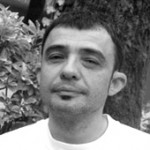
Ponente: Juan Vicente Aliaga
Juan Vicente Aliaga is a Spanish art critic who has written widely on contemporary conceptual art as well as on gender and queer theory. He is correspondent for Artforum (New York) and art critic, Exit (Madrid) and a member of the Research Group City Space and Gender Technologies at the Polytechnic University of Valencia. Publications: Orden fálico. Androcentrismo y violencia de género en las prácticas artísticas del siglo XX (Madrid, Akal, 2007); Arte y cuestiones de género (San Sebastián, Nerea, 2004); Bajo vientre. Representaciones de la sexualidad en la cultura y el arte contemporáneos (Valencia, Direcció cultural de Promoció Cultural, Museus i Belles Arts, 1997).
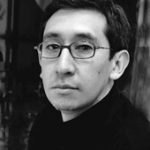
Ponente: José Luis Bravo
José Luis Bravo teaches and teaches courses on ideation, creation and management of artistic projects, photographic editing, reading and image construction, electronic publishing and art history. In Mexico he has been a professor at the Universidad Iberoamericana, UNAM, the Latin American Institute of Educational Communication and the National Institute of Fine Arts, among others. In Barcelona, he is currently Professor of the Master in Digital Arts at the Universitat Pompeu Fabra, at the Institut Superior de Disseny i Escola de la Imatge (IDEP) and at GrisArt Superior School of Photography. He also designs and gives seminars, workshops and courses.
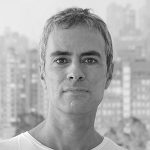
Ponente: Francesco Jodice
Francesco Jodice was born in Naples in 1967. He lives and works in Milan. He graduated as an architect and began his artistic activity in 1995. From his very first works, undertaken in a specifically urban area, he has concentrated on an analysis of the new relationships between social behaviour and the urban landscape in various geographical areas. For his works he makes use of different media and combines photography and video with writing and the creation of maps. In 2000 he was one of the founders of Multiplicity, an international network of architects and artists which develops interdisciplinary researches into the processes governing the transformation of the condition of cities.
Since 2004 he has been professor of the theory and practice of the technical image at the University of Bolzano and, since 2005, he has taught visual urban anthropology at the Nuova Accademia di Belle Arti, Milan.

Ponente: Carles Guerra
Carles Guerra (Amposta, 1965) has a PhD in Fine Arts from the University of Barcelona and a Master in Media Studies from The New School for Social Research, New York. His professional career has developed in the fields of exhibition curation, art criticism, visual production, teaching and academic research. In 2004 he was appointed Director of the Primavera Fotogràfica de Catalunya. He was Director of the Virreina Centre de la Imatge, Barcelona, from 2009 to 2011, and Chief Curator at the Museu d’Art Contemporani de Barcelona (MACBA) from 2011 to 2013.
His work and research investigate the dialogical aspects of artistic practice and the cultural policies of Post-Fordism. He is professor of Social Structures and Cultural Trends at the Universitat Pompeu Fabra and has been a member of the Greenroom Project dedicated to the analysis of contemporary documentary practices at the Center for Curatorial Studies at Bard College, New York. He has been visiting lecturer at numerous universities and institutions.
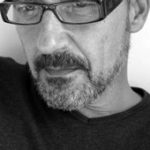
Ponente: Martí Peran
Martí Peran is Full Professor of Theory of Art at the University of Barcelona. He has participated in numerous books and catalogs of contemporary art. He usually collaborates in the press and in specialized magazines. He was a member of the editorial board of Transversal. Magazine of Contemporary Culture (1996-2002). Co-editor of the magazine Roulotte. He collaborates regularly in Exit Express y Artforum International. He has conducted workshops and seminars on criticism and curatorial practices in different centers. He has lectured in several museums and institutions (MACBA, Barcelona, MNP, Madrid, USP, Sao Paulo, Trienale, Milano, CCEBA, Buenos Aires, Townhouse, Cairo, Contemporary Art Center, Larissa, NYU, New York, Art Beijing, China , Jeu de Paume, Paris, etc.). As a curator of exhibitions, his latest projects include Post-it city. Occasional Cities (CCCB, Barcelona, 2008; MAC Santiago de Chile, Centro Cultural Sao Paulo, 2009); After Architecture (Arts Santa Mònica, Barcelona, 2009).
Lugar
MACBA, Museum of Contemporary Art, Meier Auditorium
Plaça dels Angels 1, 08001 Barcelona, Catalunya
www.macba.cat

